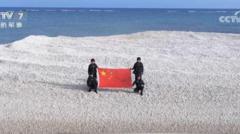Chinese state media reported that the coastguard took possession of Sandy Cay, a small sandbank in the contested Spratly Islands, amid escalating tensions with the Philippines. The Philippines has not yet responded formally, increasing concerns over regional stability.
China Increases Tensions by Seizing Sandbank in South China Sea

China Increases Tensions by Seizing Sandbank in South China Sea
The Chinese coastguard's recent control of a disputed sandbank exacerbates ongoing territorial disputes in the South China Sea, stirring concerns from the US and the Philippines.
The Chinese coastguard has taken control of a small sandbank in the South China Sea, an act reported by state media that is likely to heighten tensions in the already contentious region involving the Philippines. Images broadcasted by state-run CCTV displayed Chinese coastguard officers, dressed in black and holding the national flag, standing on the disputed Sandy Cay reef, which is part of the Spratly Islands.
The incident took place earlier in April, with CCTV claiming that China "implemented maritime control and exercised sovereign jurisdiction" over the area. The Philippines has not issued a formal statement in response to this development. The ongoing dispute between the two nations has led to heightened tensions, featuring incidents such as vessel collisions and confrontations at sea.
Sandy Cay is located close to a Philippine military outpost on Thitu Island, reportedly monitoring Chinese activities in the region. While there is no indication that China plans to permanently occupy the roughly 200 square meters of land, the coastguard reportedly vacated the area afterward. The White House expressed concern over the reported seizure, labeling it "deeply concerning if true." James Hewitt, spokesperson for the US National Security Council, commented that such actions threaten regional stability and breach international law, emphasizing that the US is consulting closely with allies.
This incident coincides with ongoing military exercises between US and Philippine forces—referred to as Balikatan exercises—designed to strengthen national defense capabilities. China has condemned these drills as provocative. Approximately 17,000 military personnel are involved in the current exercises, which include live weapon tests from the US Marine Air Defense Integrated System, marking the first deployment of such systems to the Philippines.
The Philippines maintains that these drills are focused on their national defense and are not targeted at any specific country. Third Marine Littoral Regiment Officer John Lehane expressed that this type of military training is crucial for their preparedness. During a recent visit to Manila, US Defense Secretary Pete Hegseth reaffirmed Washington's dedication to its longstanding alliance with the Philippines, promising to fortify deterrence against China.
The territorial disputes in the South China Sea date back centuries, but tensions have surged in recent years, with China asserting extensive claims through its controversial "nine-dash line." This imaginary line includes vast territories extending from its southern province of Hainan and has been supported by significant island-building and naval operations by Beijing. Other nations, including Vietnam, Taiwan, Malaysia, and Brunei, also assert claims over various islands and marine areas within this contentious sea region.



















